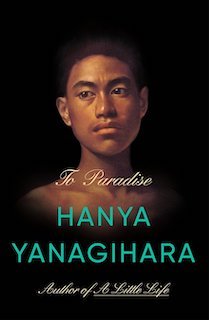Book Review - To Paradise - Hanya Yanagihara
I’ve finished ‘To Paradise’ by Hanya Yanagihara about ten hours now and yet it feels early for a book review. Still, it’s fresh in my mind after reading it for nearly three weeks and if I don’t write something now, I might find it more difficult as time goes on. Not that I will forget the book, I’m just not sure what I think about it.
Initial reactions:
-Far tooooooo long. The middle story in particular felt like it would never end, for reasons I’ll expand on.
-Did I enjoy it? I’m not sure if you could say that. Some of the writing was entrancing, and some of the stories immersive. I can say it was difficult but memorable and I don’t think I’ll be forgetting it for a while yet, especially the third part.
Washington Square
Ok, so with that out of the way - ‘To paradise’ is in three sections, that take place in 1893, 1993 and 2093. The first is set in in Washington Square, New York. The main character is David Bingham, an orphan who lives with his Grandfather. The family is very much of old money, and were founders of the free states - a group of states who have broken away, still connected to the wider United States, but differing from the ‘Southern Colonies’ and ‘The West.’
Same sex marriage is the default spousal setting in this society, and though it may seem extremely liberal on first viewing it is still divided by class and race - the Binghams have servants and black people fleeing the south are given safe passage through the Free states on their way to Canada. David is a lonely, sometimes sickly young man and his grandfather is trying to organise a marriage for him - this is how the original founding families maintain their grip on the upper echelons of society - but he has his own ideas on love and his future.
I did find this part very readable and was invested in David’s story. It had the feel of an Edith Wharton or Henry James novel. Looking back, this was probably the part that I was most invested in. I’m not going to say enjoyed.
Pandemic
Part two is divided into two sections. The first is set during another pandemic - that of the Aids criss of the 1990’s. I quickly realised that the Yanagihara was using the same names for the characters, which was a bit confusing and we were back in the same Washington Square apartment building. It was good to be in a world that was slightly familiar but I did spend some time wondering what the connection was between these stories, and wondering exactly where this book was going.
The second half of part two are was where the book really began to sag for me. I understood that it was about the colonisation of Hawaii, and maybe I’m just not interested in that enough, but it came in the form of what felt like the longest letter in literature. There didn’t seem to be a break in it and I was all out of sympathy for the father character, who I ended up disliking for being so weak. I just couldn’t get emotionally invested in this part and the writing became to annoy me - some of the sentences just meandered around the house. I’d given up on names and connections by this stage and this section couldn’t end quickly enough for me.
Dystopian
Eventually, I made it to Part three. This is the largest section of ‘To paradise’, by my kindle reckoning twice the size of the other two stories, taking up 50% of the book. I’d imagine that it’s this part that readers and reviewers will focus on the most. It is set between 2050 and 2093 in a totalitarian, dystopian , barely recognisable, New York. The far right has used successive pandemics to push through more draconian measures, and citizens live in different sections, depending on their social status and position in the regime. It’s basically 1984 meets a nightmare version of where the present world seems to be going in a handcart.
We’re following Charlie and her grandfather Charles in this part (names again). The grandfather is a scientist and his story is told in the form of letters - Charlie’s story is told in the first person narrative. This is a place of relocation camps, crematoriums, waves of the virus that traumatically, affect children, containment centres that people don’t return from, and sure we can’t forget good ol’ global warming and hunger. I really struggled with this at times. This was the first fiction I have read that relates to the pandemic and it just felt really close to the bone and at times an utterly depressing vision of where society could go. At the same time, I kept going as there is a narrative drive to this section that for me wasn’t present in the middle section and I was interested in the story of young Charlie. Maybe there will never be a place where we can look back at pandemics in the rear view mirror. But it felt too soon for me and I couldn't wait to get out of this nightmare of a place.
To Paradise Summary
This is the longest book review I’ve ever written, as befitting a novel lasting 720 pages. ‘To paradise’ is a complex unwieldy beast of a book that I could never quite get to grips with in terms of how the stories connected. There were recurring themes such as loneliness and love without affection, sexuality, orphans and role models, inheritance in terms of status and culture, but the book as a whole just felt cold and clinical at times with parts that never quite clicked together. I read a novella just before I finished this novel and it felt like water on a desert- I just wanted a book that told a story with economical prose and descriptions, that was short and to the point
It’s certainly an ambitious novel, effectively three books in one, and it’s incredibly clever how the three have been linked. As much as I found it difficult, I am glad to have read it. It’s an experience, which you can’t say too often.
There is a lot to recommend in ‘To paradise’, especially the first part and some of the third section, (depending on how ready you are for covid related fiction) and there were times when I disappeared into Hanya Yanagihara’s writing. It’s certainly memorable and it’s only by writing this review that I have helped to clarify how I felt it. Maybe the problem is with me - but there just weren’t enough colours in this book, which is what I needed. There were large sections where it didn't engage me enough but if you are about to embark on it, I wish you well. I was going to say it would be a good book if you were going into isolation for a couple of weeks, but maybe not.
Book review - To paradise - Hanya Yanagihara
Published January 11th 2022
Thank you to Pan Macmillan and Netgalley for the Advanced Reader Copy.
720 Pages



